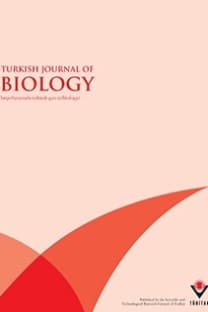The effect of survivin gene promoter polymorphism on breast cancer
Breast cancer, apoptosis inhibitor protein, survivin, survivin gene promoter polymorphism, SNP
The effect of survivin gene promoter polymorphism on breast cancer
Breast cancer, apoptosis inhibitor protein, survivin, survivin gene promoter polymorphism, SNP,
___
- Altieri DC (2001). The molecular basis and potential role of survivin in cancer diagnosis and therapy. Trends Mol Med 7: 542–547.
- Altieri DC (2003). Validating survivin as a cancer therapeutic target. Nat Rev Cancer 3: 46–54.
- Ambrosini G, Adida C, Altieri DC (1997). A novel anti-apoptosis gene, survivin, expressed in cancer and lymphoma. Nat Med 3: 917–921.
- Ambrosini G, Adida C, Sirugo G, Altieri DC (1998). Induction of apoptosis and inhibition of cell proliferation by survivin gene targeting. J Biol Chem 273: 11177–11182.
- Bayram S, Akkız H, Bekar A, Akgöllü E (2011). The association between the survivin –31G/C promoter polymorphism and hepatocellular carcinoma risk in a Turkish population. Cancer Epidemiol 35: 555–559.
- Borbély AA, Murvai M, Szarka K, Kónya J, Gergely L, Hernádi Z, Veress G (2007). Survivin promoter polymorphism and cervical carcinogenesis. J Clin Pathol 60: 303–306.
- Borges Bdo N, Burbano RR, Harada ML (2011). Survivin -31C/G polymorphism and gastric cancer risk in a Brazilian population. Clin Exp Med 11: 189–193.
- Christensen LA, Finch RA, Booker AJ, Vasquez KM (2006). Targeting oncogenes to improve breast cancer chemotherapy. Cancer Rese 66: 4089–4094.
- Gazouli M, Tzanakis N, Rallis G, Theodoropoulos G, Papaconstantinou I, Kostakis A, Anagnou NP, Nikiteas N (2009). Survivin -31G/C promoter polymorphism and sporadic colorectal cancer. Int J Colorectal Dis 24: 145–150.
- Jang JS, Kim KM, Kang KH, Choi JE, Lee WK, Kim CH, Kang YM, Kam S, Kim IS, Jun JE et al. (2008). Polymorphisms in the survivin gene and the risk of lung cancer. Lung Cancer 60: 31–39.
- Liu Y, Du F, Chen W, Yao M, Lv K, Fu P (2014). EIF5A2 is a novel chemoresistance gene in breast cancer. Breast Cancer. Mar 18.
- Qin C, Cao Q, Li P, Ju X, Wang M, Chen J, Wu Y, Meng X, Zhu J, Zhang Z et al. (2012). Functional promoter -31G>C variant in survivin gene is associated with risk and progression of renal cell cancer in a Chinese population. PLoS One 7: e28829.
- Rödel C, Haas J, Groth A, Grabenbauer GG, Sauer R, Rödel F (2003). Spontaneous and radiation-induced apoptosis in colorectal carcinoma cells with different intrinsic radiosensitivities: survivin as a radioresistance factor. Int J Radiat Oncol Biol Phys 55: 1341–1347.
- Srivastava K, Srivastava A, Mittal B (2012). Survivin promoter -31G/C (rs9904341) polymorphism and cancer susceptibility: a meta-analysis. Mol Biol Rep 39: 1509–1516.
- Theodoropoulos GE, Michalopoulos NV, Panoussopoulos SG, Taka S, Gazouli M (2010). Effects of caspase-9 and survivin gene polymorphisms in pancreatic cancer risk and tumor characteristics. Pancreas 39: 976–980.
- Tran J, Master Z, Yu JL, Rak J, Dumont DJ, Kerbel RS (2002). A role for survivin in chemoresistance of endothelial cells mediated by VEGF. Proc Natl Acad Sci USA 99: 4349–4354.
- Upadhyay R, Khurana R, Kumar S, Ghoshal UC, Mittal B (2011). Role of survivin gene promoter polymorphism (-31G>C) in susceptibility and survival of esophageal cancer in northern India. Ann Surg Oncol 18: 880–887.
- Visvanathan K, Chlebowski RT, Hurley P, Col NF, Ropka M, Collyar D, Morrow M, Runowicz C, Pritchard KI, Hagerty K et al. (2009). American Society of Clinical Oncology clinical practice guideline update on the use of pharmacologic interventions including tamoxifen, raloxifene, and aromatase inhibition for breast cancer risk reduction. J Clin Oncol 27: 3235–3258.
- Wang YH, Chiou HY, Lin CT, Hsieh HY, Wu CC, Hsu CD, Shen CH (2009). Association between survivin gene promoter -31 C/G polymorphism and urothelial carcinoma risk in Taiwanese population. Urology 73: 670–674.
- Xu Y, Fang F, Ludewig G, Jones G, Jones D (2004). A mutation found in the promoter region of the human survivin gene is correlated to overexpression of survivin in cancer cells. DNA Cell Biol 23: 527–537.
- Yamamoto T, Tanigawa N (2001). The role of survivin as a new target of diagnosis and treatment in human cancer. Med Electron Microsc 34: 207–212.
- Yamamoto T, Manome Y, Miyamoto A, Tanigawa N (2003). Development of a novel gene therapy using survivin antisense expressing adenoviral vectors. Gan To Kagaku Ryoho 30: 1805–1808.
- Yamashita S, Masuda Y, Kurizaki T, Haga Y, Murayama T, Ikei S, Kamei M, Takeno S, Kawahara K (2007). Survivin expression predicts early recurrence in early-stage breast cancer. Anticancer Res 27: 2803–2808.
- Yang L, Zhu H, Zhou B, Gu H, Yan H, Tang N, Dong H, Sun Q, Cong R, Chen G et al. (2009). The association between the survivin C-31G polymorphism and gastric cancer risk in a Chinese population. Dig Dis Sci 54: 1021–1028.
- Yazdani N, Sayahpour FA, Haghpanah V, Amiri P, Shahrabi-Farahani M, Moradi M, Mirmiran A, Khorsandi MT, Larijani B, Mostaan LV et al. (2012). Survivin gene polymorphism association with papillary thyroid carcinoma. Pathol Res Pract 15; 208: 100–103.
- Zahedi P, Aminimoghaddam S, Sayahpour FA, Haghpanah V, Amiri P, Fereidoni F, Mahrampour E, Larijani B, Tavakkoly-Bazzaz J, Amoli MM (2012). Association of survivin gene polymorphism with endometrial cancer. Int J Gynecol Cancer 22: 35–37.
- ISSN: 1300-0152
- Yayın Aralığı: Yılda 6 Sayı
- Yayıncı: TÜBİTAK
Genotoxic, cytotoxic, and apoptotic effects of crude extract of Usnea filipendula Stirt. in vitro
Serap ÇELİKLER KASIMOĞULLARI, Seyhan ORAN, Ferda ARI, Engin ULUKAYA
Aging and cancer: molecular facts and awareness for Turkey
Muhammad MANSHA, Muhammad WASIM, Ali Raza AWAN, Asma Abdul LATIF
The role of ABC transporters in anticancer drug transport
Hacer Ezgi KARAKAŞ, Devrim GÖZÜAÇIK
The effect of survivin gene promoter polymorphism on breast cancer
Mehmet Deniz ALTIPARMAK, Celal İsmail BİLGİÇ, Nüzhet Cenap DENER, Esra GÜNDÜZ, Sibel YENİDÜNYA, Muradiye ACAR, Meral ŞEN, Mehmet GÜNDÜZ
Francesca CEPRANI, Franco SPIRITO, Roberto PIERGENTILI
Muhammad MANSHA, Muhammad WASIM, Ali Raza AWAN, Asma Abdul LATIF
Triumph or tragedy: progress in cancer
